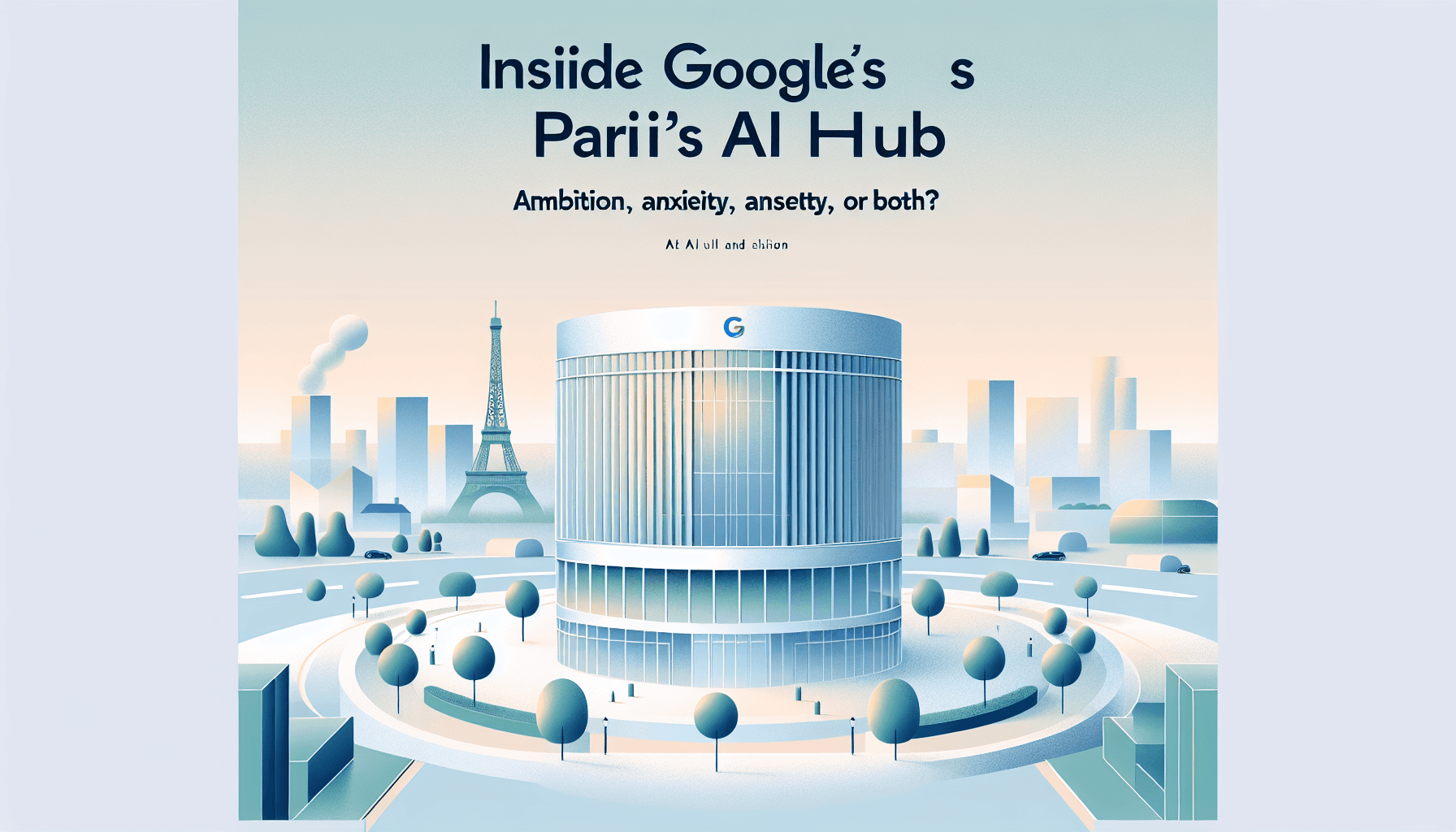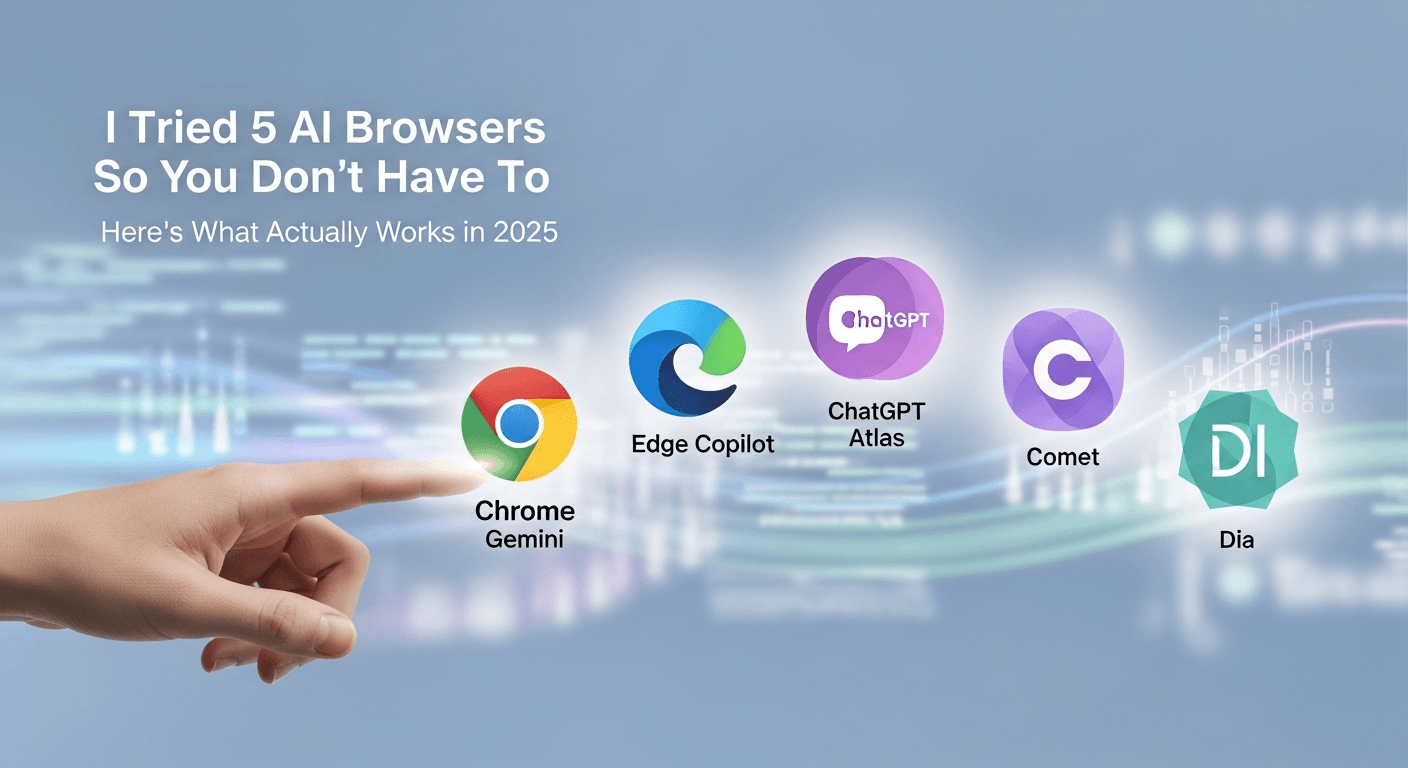
Inside Google’s Paris AI Hub: Ambition, Anxiety, or Both?
Inside Google’s Paris AI Hub: Ambition, Anxiety, or Both?
Google has opened a new AI hub in Paris. On paper, it seems like a smart move to tap into European talent and an expanding AI ecosystem. However, it also indicates that Google is acutely aware of the rapidly changing AI landscape and wants to ensure it stays ahead of the game.
What exactly did Google announce?
Google is establishing a dedicated AI hub in Paris to unite researchers, product teams, and safety experts all under one roof. Although the company has long had a presence in France through Google Research and DeepMind, this new move consolidates those efforts and elevates the visibility of its work in Europe. TechCrunch described the hub as a sign of strategic apprehension in a fast-paced market where quicker competitors have captured attention and momentum (TechCrunch).
The aim of the hub extends beyond the headlines, focusing on three main objectives:
- Accelerating research and product development across teams.
- Anchoring safety and governance efforts within the EU, closer to regulators and partners.
- Competing more effectively for talent and startups located in Paris.
This combination makes strategic sense and illustrates how global and local dynamics are influencing the AI race.
Why Paris, and why now?
Paris has emerged as a vibrant AI hub, boasting a mix of academic prowess, startup enthusiasm, and big tech labs. Consider these factors:
- Top-tier talent and research. Institutions such as INRIA, ENS, Polytechnique, and Sorbonne consistently produce researchers who contribute to industry labs. Notably, Meta made an early commitment to the city with its FAIR Paris initiative back in 2015 (Meta AI).
- Hot startups. Mistral AI, based in Paris, has secured significant funding and formed partnerships with major cloud providers, showcasing European models on the global stage (Reuters).
- Regulatory gravity. The EU AI Act is reshaping how frontier models are developed, tested, and deployed. Building in the region aids in compliance, engagement, and trust (EU Council).
For Google, Paris offers proximity to a wealth of talent, a dynamic startup scene, and access to the regulators shaping the rules. These are compelling advantages.
Ambition or anxiety? Reading the move
Launching a new hub is a power play, but it also responds to mounting pressure. Several dynamics are in play:
1) Competitive heat and pace
OpenAI has set the pace for consumer and developer AI with ChatGPT and rapid model releases, while Microsoft has integrated AI across its cloud and productivity offerings. Google possesses strong research and product capabilities but has faced public setbacks, such as the 2024 pause in Gemini image generation due to accuracy concerns (Google). Establishing a hub in Paris signals Google’s commitment to speed and seriousness in a landscape where perception is crucial.
2) Talent concentration
The competition for AI talent is fierce. Europe excels in foundational research and applied machine learning. A high-visibility hub is essential to attract and retain researchers who might otherwise be drawn to fast-growing local competitors or international rivals. The Stanford AI Index highlights the concentration of advanced AI talent, making location strategy a pivotal factor (Stanford AI Index).
3) Regulatory signaling
With the EU AI Act progressing from legislation to implementation, model providers will need ongoing engagement regarding risk management, transparency, and testing. Establishing safety and policy work within the EU is as much about building trust as it is about meeting regulatory requirements (EU Council).
4) Go-to-market alignment
Enterprises across the EMEA region are increasingly adopting AI, but many face data residency and industry-specific requirements. Bolstering an in-region hub allows Google to better align its research with customer needs and partner ecosystems. Other major players are making similar strides, such as AWS with the announcement of a European Sovereign Cloud to meet regulatory expectations (AWS).
What this means for developers, startups, and customers
The broader ecosystem stands to gain practical advantages from the Paris hub:
- More access points. Expect an increase in local events, research discussions, and collaborative opportunities with universities and labs.
- Startup support. Programs like Google for Startups and Google Cloud typically expand alongside regional hubs, offering everything from credits to mentorship (Google for Startups) (Google Cloud for Startups).
- Model availability. Google is committed to advancing its Gemini models for developers and enterprises, including new long-context variants announced at I/O 2024 (Google).
- Closer engagement on safety. Expect more EU-focused efforts on evaluations, red-teaming, and responsible AI, working in coordination with regulators and standards organizations.
Ultimately, success will hinge on the tangible outcomes from this hub. While they can attract top talent, they can become mere PR exercises without ongoing investment and the delivery of impactful products.
How Google stacks up against rivals in Europe
- OpenAI and Microsoft. OpenAI is expanding its footprint outside the U.S., opening offices in London and Dublin to strengthen its EMEA presence (OpenAI London) (OpenAI Dublin). Microsoft is actively investing in AI infrastructure and partnerships throughout the region, including collaborations with Mistral AI (Reuters).
- Meta. Meta’s FAIR lab in Paris is one of the oldest major tech AI facilities in Europe, and its open-weight Llama models have transformed the landscape for developers and enterprises (Meta AI).
- AWS. AWS is focusing on data sovereignty commitments through its European Sovereign Cloud, targeting highly regulated sectors (AWS).
The takeaway is clear: everyone is localizing. For Google, Paris serves as both a strategic hub and a message of its intent to remain relevant as the AI landscape evolves quickly.
Bottom line
Google’s new AI hub in Paris represents a strategic investment in talent and proximity while addressing both competitive and regulatory realities. It embodies a blend of ambition and anxiety—an effort to innovate faster, attract top talent, and foster trust in Europe. Ultimately, the future trajectory of Google’s AI initiatives will depend on the tangible results delivered by the hub within the next 12 to 18 months.
FAQs
What is Google’s Paris AI hub supposed to do?
It aims to consolidate research, product development, and safety teams to accelerate model work, collaborate with European partners, and engage regulators on responsible AI matters.
Why did Google pick Paris?
Paris boasts a rich pool of academic talent, an active startup environment (including notable players like Mistral AI), and easy access to EU institutions involved in shaping AI regulations.
Is this mainly about regulation?
While regulation is a significant factor, it’s not the sole focus. The hub also emphasizes recruitment, speeding up product development cycles, and competing with rivals expanding throughout Europe.
What models and tools might benefit?
Expect continued emphasis on Gemini models and developer tools introduced at Google I/O 2024, including long-context functionalities and enterprise-level guardrails.
Will startups gain practical support?
Highly likely. Google frequently aligns hubs with community programs, credits, and partnerships facilitated through Google for Startups and Google Cloud.
Sources
- TechCrunch – Google’s new AI hub in Paris
- Meta – Announcing FAIR Paris (2015)
- Reuters – Microsoft partners with France’s Mistral AI (2024)
- Council of the EU – EU AI Act adoption (2024)
- Google – An update on Gemini image generation (2024)
- Stanford – AI Index Report
- AWS – European Sovereign Cloud announcement
- OpenAI – London office
- OpenAI – Dublin office
- Google – I/O 2024 AI announcements
- Google for Startups – Programs
- Google Cloud for Startups – Credits
Thank You for Reading this Blog and See You Soon! 🙏 👋
Let's connect 🚀
Latest Insights
Deep dives into AI, Engineering, and the Future of Tech.

I Tried 5 AI Browsers So You Don’t Have To: Here’s What Actually Works in 2025
I explored 5 AI browsers—Chrome Gemini, Edge Copilot, ChatGPT Atlas, Comet, and Dia—to find out what works. Here are insights, advantages, and safety recommendations.
Read Article


